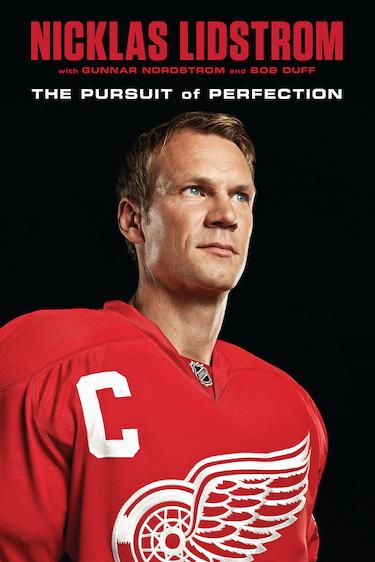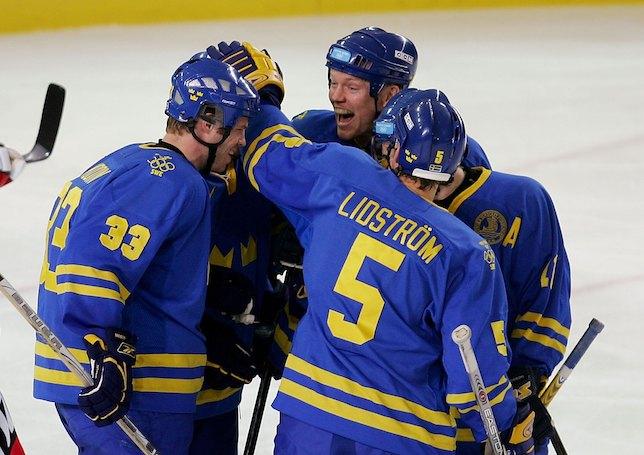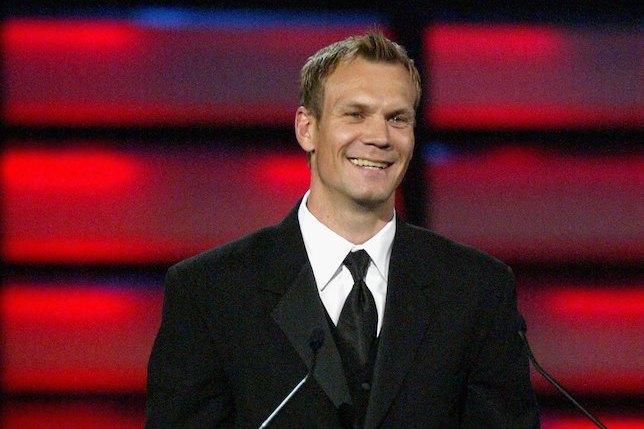Nicklas Lidstrom helped the Red Wings to four Stanley Cups and won the Norris Trophy seven times. But earning an Olympic gold medal with Sweden in 2006 is one of the crowning moments of his career as he expresses in his new book, Nicklas Lidstrom: The Pursuit of Perfection.
Sweden sent a powerhouse team to the 2006 Olympic Games. This time, the Olympiad was held in Torino, Italy, and the national team included the names of Lidstrom, Sundin, Forsberg, Lundqvist, Alfredsson, Holmstrom, Zetterberg, Fredrik Modin, and the Sedin twins, Daniel and Henrik. It was a star-filled lineup and the mission was clear -- revenge for the fiasco in Salt Lake City and the heartbreaking loss to Finland in the quarterfinals of the 1998 Nagano Olympics. The window for what media in Sweden called the Golden Generation was closing. The country's three major NHL stars were getting older -- Lidstrom and Sundin were 35, and Forsberg was 32 -- and fans were wondering, could they deliver the gold medal this time?
 Lidstrom, who'd endured years of heartbreak with the Red Wings before finally getting to drink from the Stanley Cup, understood better than most that talent alone wouldn't get the job done for the Swedes.
Lidstrom, who'd endured years of heartbreak with the Red Wings before finally getting to drink from the Stanley Cup, understood better than most that talent alone wouldn't get the job done for the Swedes.
"We knew we had a great team, but we also had great teams in Nagano and Salt Lake City and that wasn't enough to reach the medal rounds," Lidstrom said. "It was something that was in the back of our minds, for sure. We definitely had something to prove. In Torino, suddenly everything came together for us as a group. We clicked and got better and better from game to game."
The last game for the Swedes in group play was against Slovakia. A win would set up a matchup with Canada in the quarterfinals; a loss would give them Switzerland. The speculation began: would Sweden tank its game against Slovakia to avoid the Canadians?
In the end, Slovakia shutout Sweden 3–0. The result started a flood of rumors and to this day, many hockey writers and experts are convinced that Sweden did not give its all. More fuel was added to the fire when Forsberg, in an interview with the filmmakers behind the Swedish documentary #21 Peter Forsberg in December of 2011, more or less confessed that they hadn't done their best against Slovakia.
Michael Farber, the main hockey writer at Sports Illustrated at that time and was covering the tournament, has his own explanation of how Sweden got away with it. "I've always teased Lidstrom and some of the other Swedes about the two-minute five-on-three that Sweden had against Slovakia in the last round-robin match in Torino 2006, a game the Tre Kronor were obviously not interested in winning," Farber said. "Better matchup in the knockout, Switzerland or Canada?
"The power play of Lidstrom, Forsberg, Sundin, Modin, and Alfredsson didn't register a single shot in those minutes. Lidstrom did, however, hit the post. I swear he was so good that he hit the post on purpose, so it would sort of look like Sweden was trying, which it wasn't."

Lidstrom dismisses Farber's claim. "I know that Michael thinks that, he told me his theory some years later," Lidstrom said. "My answer is that I'm not that good. I can't do that. I did not purposely hit the post on that power play. What I can say is that it wasn't a game of life or death for us. A loss wouldn't kick us out of the tournament. I think it was Ken Holland who compared it to a semifinal in the 100 meters in track and field and you finish second. That is totally fine, because you make it to the finals anyway.
"It was a similar situation for us in the game against Slovakia in Torino. We weren't going to throw ourselves on the ice to block a shot with our face. We knew we had already made it to the final rounds. Under those circumstances, you don't want to get injured, but of course you want to win every game."
In the quarterfinals, Lidstrom and his teammates rolled over Switzerland in a 6–2 win, Lidstrom collecting two assists, and then defeated the Czech Republic 7–3 in the semifinals, with Lidstrom dishing out another helper. The Swedes had made it to the finals and, much to their surprise, they would not be up against Canada. The Canadians lost 2–0 to Russia in the quarterfinals and then Finland knocked out Russia 4–0 and came storming into the gold-medal game.
"That we were up against Finland felt really good for a number of reasons," Lidstrom said. "First of all, the hockey rivalry between our countries is intense. Sweden and Finland, that's huge. It's one of the greatest rivalries in all of sports. It goes way back. And we also had a score to settle after the loss in Nagano."

Kimmo Timonen gave Finland the lead 14:45 into the opening period, but Sweden came back with two power play goals in the second by Zetterberg and fellow Red Wing Niklas Kronwall. Ville Peltonen tied the game with five minutes left in the second period.
The third period started with a four-on-four and that's when the Golden Generation stepped up. Saku Koivu broke his stick during a faceoff against Sundin, and suddenly the Finns were one man short. The deciding moment had arrived. Sundin passed the puck to Forsberg, who dropped it back to the Swedish team captain.
"I immediately noticed that Koivu had gone to the bench to get a new stick and that it would create space for me inside the blueline for a shot," Lidstrom recalled. "I just waited for Mats to get me the puck. When the pass came, I was so ready. Peter had told us at the pregame meeting that we should aim high on their goaltender, Antero Niittymaki, his teammate on the Philadelphia Flyers. Forsberg knew everything about Niittymaki's weaknesses and told us that he was extremely hard to score on low, that he covered most of the ice there. So, the best chance to get shots past him was to shoot high. That was on my mind when Sundin's pass landed on my stick."
Lidstrom could see the puck leave his stick and go straight to the far high corner. "It almost felt like watching the whole sequence in slow motion," Lidstrom said. "After playing so many years as I had, you have memories from situations like this where the puck often hits a stick or an opponent in front of the goal and suddenly moves in another direction and misses the net. This time, I could see how the puck went in under the crossbar on Niittymaki's stick side. It was magic."
Holmstrom saw the goal from the penalty box. "From the angle where I was sitting, I could see how Nick put all the power on this slap shot and I knew before it reached the net that it was a goal," Holmstrom said. "It was the perfect shot."
Lidstrom's goal after 10 seconds of the final frame turned out to be the winning goal in a 3–2 victory. It was fitting that the assists on the goal came from Sundin and Forsberg.
"Yeah, of course it was special having Peter and Mats assisting me on that winning goal," Lidstrom said. "We had been through so much together and to have a chance to end our time together on the national team with an Olympic gold medal was so special. A fairy tale ending."
-- Excerpted by permission from Nicklas Lidstrom: The Pursuit of Perfection by Nicklas Lidstrom With Gunnar Nordstrom And Bob Duff. Copyright (c) 2019. Published by Triumph Books. All rights reserved. No part of this excerpt may be reproduced or reprinted without permission in writing from the publisher. Available for purchase from the publisher, Amazon, Barnes & Noble and Apple Books. Follow Nicklas Lidstrom on Twitter @NicklasLidstrom. Follow Bob Duff on Twitter @asktheduffer.





